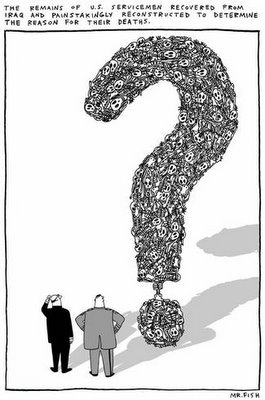Tush aimless on Iraq
 One of the more troublesome and important stories that seems to be emerging on the American political news- and blog-front today is Seymour Hersh's article in the December issue of the New Yorker (available online today). Mr. Hersh was interviewed about the article on CNN's Late Edition with Wolf Blitzer on Sunday [transcript here] and the interview, together with the online publication of Hersh's article today, has generated quite a lot of discussion among the lefty blogoshpere today.
One of the more troublesome and important stories that seems to be emerging on the American political news- and blog-front today is Seymour Hersh's article in the December issue of the New Yorker (available online today). Mr. Hersh was interviewed about the article on CNN's Late Edition with Wolf Blitzer on Sunday [transcript here] and the interview, together with the online publication of Hersh's article today, has generated quite a lot of discussion among the lefty blogoshpere today.
Hersh's piece is an assessment of the current views of the Tush White House on the subject of the Iraq War, troop withdrawals, time tables for both, outcome possibilities, political fallout and general philosophies of the powers in charge. Under recent pressure from Democrats and disappearing public approval ratings, Tushies have been insinuating a plan for drawdown of ground troops in the un-specified future. One of the morsels of new, and scary, information is the Tushies' plan to increase air power when/if ground forces are withdrawn:
A key element of the drawdown plans, not mentioned in the President’s public statements, is that the departing American troops will be replaced by American airpower. Quick, deadly strikes by U.S. warplanes are seen as a way to improve dramatically the combat capability of even the weakest Iraqi combat units. The danger, military experts have told me, is that, while the number of American casualties would decrease as ground troops are withdrawn, the over-all level of violence and the number of Iraqi fatalities would increase unless there are stringent controls over who bombs what.
These details and others were discussed by Hersh in the CNN interview with Wolf Blitzer.
HERSH: Well, you know, what I was writing about in The New Yorker this week is our plan is to pull out American troops if we start to do that. And I think the president probably will next year. But the war is not going to slow down. We're going to increase the pace of air operations. There's going to be more bombing in direct support of Iraqi units now.
BLITZER: Let me read to you what you write in The New Yorker magazine, the article entitled "Up in the Air." "A key element of the drawdown plans, not mentioned in the President's public statements, is that the departing American troops will be replaced by American airpower. Quick, deadly strikes by U.S. warplanes are seen as a way to improve dramatically the combat capability of even the weakest Iraqi combat units."
Explain what you're hearing from your sources.
HERSH: Oh. It's very simple. That we have a lot of units in Iraq that are not very good. And if we're going to put...
BLITZER: Iraqi units.
HERSH: Yes. Right. American -- not American.
BLITZER: Ground troops.
HERSH: Absolutely. Not very competent. Very weak. And if we must -- many of them Shiite, many of them controlled by militias. I mean, they're not necessarily loyal to any particular regime. And if we pull away the American ground support and the American air support, they're in trouble.
But if we -- we can take out troops if we increase air. In other words, the temple of air bombing, bombing's sort of the unknown story right now. We don't know how many bombs are dropped, where. Nobody reports publicly as they did, Wolf, in Vietnam.
During the Vietnam war, we got a daily total of how many missions, sorties per day, how much tonnage. We have no idea here how many bombs are actually dropping every day and where. But the idea is, you increase the pace of the bombing. And that will make an inadequate Iraqi unit be able to stand up a little bit, certainly against the insurgency. That's the thinking.
BLITZER: And then you go on to write this: "The prospect of using air power as a substitute for American troops on the ground has caused great unease. For one thing, Air Force commanders, in particular, have deep-seated objections to the possibility that Iraqis eventually will be responsible for target selection. 'Will the Iraqis call in air strikes in order to snuff rivals, or other warlords, or to snuff members of your own sect and blame someone else?' another senior military planner now on assignment in the Pentagon asked."
Your concern, specifically, is that American air power, which can be decisive, clearly, is going to be used for untoward, for bad purposes.
HERSH: It's not my concern. It's the concern of many senior generals in the air business, you know, in the Air Force. And planners, because they say, this is, you know, the power of American air is enormous. And the idea, it's, and it's, this is a skill.
People talk in terms, to me, the Air Force planners, of the exquisite nature of air bombing. The idea that you're going to turn over this control, this kind of force, to Iraqi units who can be penetrated by the insurgency, that have a lot of internal battles, as I say, many are militias. And they have problems that other people and other militias -- who knows what will motivate them?
This sounds like a pretty sketchy and incredibly violent plan. A plan drawn by those with no regard for human life. I've never been sure what is the best course of action at this stage of the game. A complete and abrupt military pullout certainly leaves the scene of the crime in a worse-than-Saddam state. However, a continuation of the current, ill-defined and unspecified approach is also not helpful to Iraqis or to Americans or to most of the rest of the world. I think the arguments by Murtha, Sheehan and others have at least been useful to highlight the latter fact, if not to argue the complete withdrawal option effectively.
Hersh goes on to describe the even scarier state of the Tush psyche and his "decision-making from God". Confirming what we on the left have been afraid of, the President of the United States is apparently inaccessible via logic, facts, investigation, research, assessment or any other means based in reality. From the New Yorker article:
And from the CNN transcript:Current and former military and intelligence officials have told me that the President remains convinced that it is his personal mission to bring democracy to Iraq, and that he is impervious to political pressure, even from fellow Republicans. They also say that he disparages any information that conflicts with his view of how the war is proceeding.
Bush’s closest advisers have long been aware of the religious nature of his policy commitments. In recent interviews, one former senior official, who served in Bush’s first term, spoke extensively about the connection between the President’s religious faith and his view of the war in Iraq. After the September 11, 2001, terrorist attacks, the former official said, he was told that Bush felt that “God put me here” to deal with the war on terror. The President’s belief was fortified by the Republican sweep in the 2002 congressional elections; Bush saw the victory as a purposeful message from God that “he’s the man,” the former official said. Publicly, Bush depicted his reelection as a referendum on the war; privately, he spoke of it as another manifestation of divine purpose.
The former senior official said that after the election he made a lengthy inspection visit to Iraq and reported his findings to Bush in the White House: “I said to the President, ‘We’re not winning the war.’ And he asked, ‘Are we losing?’ I said, ‘Not yet.’ ” The President, he said, “appeared displeased” with that answer.
“I tried to tell him,” the former senior official said. “And he couldn’t hear it.”
HERSH: Suffice to say this, that this president in private, at Camp David with his friends, the people that I'm sure call him George, is very serene about the war. He's upbeat. He thinks that he's going to be judged, maybe not in five years or ten years, maybe in 20 years. He's committed to the course. He believes in democracy.
HERSH: He believes that he's doing the right thing, and he's not going to stop until he gets -- either until he's out of office, or he falls apart, or he wins.
BLITZER: But this has become, your suggesting, a religious thing for him? HERSH: Some people think it is. Other people think he's absolutely committed, as I say, to the idea of democracy. He's been sold on this notion.
He's a utopian, you could say, in a world where maybe he doesn't have all the facts and all the information he needs and isn't able to change.
I'll tell you, the people that talk to me now are essentially frightened because they're not sure how you get to this guy.
We have generals that do not like -- anymore -- they're worried about speaking truth to power. You know that. I mean that's -- Murtha in fact, John Murtha, the congressman from Pennsylvania, which most people don't know, has tremendous contacts with the senior generals of the armies. He's a ranking old war horse in Defense Appropriations Subcommittee. The generals know him and like him. His message to the White House was much more worrisome than maybe to the average person in the public. They know that generals are privately telling him things that they're not saying to them.
And if you're a general and you have a disagreement with this war, you cannot get that message into the White House. And that gets people unnerved.
An adept Daily Kos diarist, ademption, has written a summary of the Hersh article that is a pretty good read. The most knowledgeable academic blogger on this subject, Juan Cole, also has comments on Hersh's article together with additional information on the implications for the various ethnic and terrorist factions within Iraq. His post is here.
Cartoon from Mr. Fish - Catch of the Day
Technorati tag(s): liberal politics
The Fly Fishing Loop is sponsored by flydepot.com
[ Home Waters | Next | Random | List | Search ]

This work is licensed under a Creative Commons Attribution-NonCommercial-ShareAlike 2.5 License.





